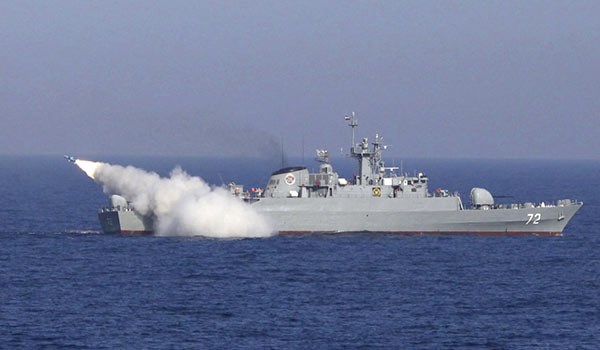
RNA - The two-day wargames cover over 2 million sq. kilometers of Iranian territorial waters in the Sea of Oman and the Indian Ocean. The drills, which also cover the Bab el-Mandab and the Southeastern Makran regions, are intended to train in the fight against terrorism and piracy, using ships, submarines and helicopters.
This year’s military exercises are held to test combat capabilities and readiness of the forces to address any possible terrorist threats and hostile actions against the country. Despite being an annual drill, and seemingly no different from any of the past versions, war-party Washington still claims it is a source of tensions with the US Navy, as it amounts to the first Iranian military drill since President Trump’s inauguration. Washington also claims it is provocative as the drill comes just two weeks after a joint US-UK drill called United Trident, held in roughly the same area, which ended with a feigned move toward Iranian waters. This is rubbish:
1- Iran’s naval drills are primarily for defending the territorial waters and ensuring regional security and peace. The focus is on practicing modern warfare, coordinating operations, including dispatch of troops for reinforcements, and landing and rescuing operations, a key component of the drill. It reflects the rapidly evolving dynamics of the contemporary operating environment, but also recognizes that many things endure, not least the nature of terrorism and conflict.
2- This is not about striving after a strategic naval supremacy (although Iran holds the longest sea borders in the Persian Gulf and the Sea of Oman), much less trying to bring under control the significant sea areas. Unlike the regional and tans-regional watchers, Iran doesn’t seek any escalation of tensions, as it will only damage the economic security (oil exports) and thus the region’s political security and stability.
3- The raison d’etre for Iranian armed forces is to defend. This is how force is ultimately applied in a military context, so defense is the purpose, for which forces should be most prepared. But armed forces do not just defend. They are also able to use force to shape perceptions and secure influence in pursuit of national objectives. They do this in conjunction with the other levers of power: diplomatic.
4- This is not true for the United States and its joint drills with other navies in the Persian Gulf. They only urge presence of international players, as regional countries are incapable of holding and managing the war games, just to the opposite of Iran's belief. The joint drills are due to frequent failures in Yemen and Syria fronts. They conduct drills to flex muscles militarily to the regional and international players. Saudi Arabia and other regional watchers are dependent in terms of weapons provision to the American and British sides, and their military drills are but a simple show. They lack the potentials to seriously address any threats in the future.
5- These watchers always play the victim. For instance, the US Navy has in the past pointed the finger at Iran for having its sailors lost and detained in Iranian territorial waters! They still claim an uptick in confrontations by Iranian vessels. It is obvious that they don’t want to take responsibility for their everyday mistakes - US warships getting dangerously close to Iranian territorial waters, even inching for military confrontation. They have trouble accepting that the US Navy has contributed to the insecurity of the Persian Gulf and the greater region.
6- Washington holds onto its grudges and points the finger at Tehran, ignoring its undeniable role in perpetuating the problem - occasional confrontations between Iranian speedboats and American gunships. They may not agree that they are completely responsible for everything that occurs, but they can always ask if they contribute somehow - directly or indirectly. Asking this question invites them to be responsible, mature, cooperative, and cautious. Plus, it helps them avoid making similar mistakes again - instead of trying to be manipulative, coercive, and underhanded in the hope to get what they want: International endorsement to be in the Persian Gulf - illegally and provocatively.
Taken together, the US Navy is not the good guy here and the whole world is suspicious of its joint naval maneuvers. Iran is not playing a game with them either. The country’s naval officials never listen to Washington’s stories of manipulation and anxiety. In their words, “Iranian naval forces are going to be where they are, and they are not going to contribute to the American acts of transgression that only stokes further instability.”
No doubt Iran’s naval forces are at the heart of the security apparatus in the Persian Gulf and the Sea of Oman. No regional watcher or foreign player can ever cut them off from the existing equation and order. The trans-regional watchers are better off taking a different, more positive approach, such as not interfering in the drills and missions of Iranian forces. They know, and the whole world knows, that Iran’s annual drills are not intended to escalate tensions in Persian Gulf and Strait of Hormuz. The overarching goal is not to obtain naval superiority over the regional rivals. Rather, such drills show Iran's power in a bid to deter trouble-makers from making trouble. This is called the power of deterrence, which - opposite to the US allegations - enhances security and stability in the waterway which happens to be the world's energy lifeline by deterring warmongers. So this is the clear message that the US should get, irrespective of all its media propaganda and warfare that is intended to stir up tensions to justify its presence in the region.
847/940